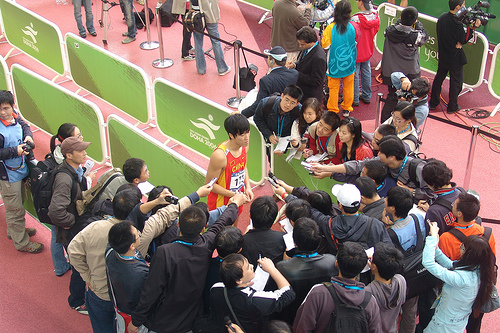Buenas tardes, estimados alumnos.
Comenzamos una serie de ejercicios dedicados a revisar los puntos principales del programa del curso.
Hoy toca: Sports and news.
Nota: Los textos están seleccionados tanto del programa CREA como de otras fuentes, a quienes doy las gracias y cito, pero todos tienen el nivel del curso.
Texto nº 1:
A FALLEN CHAMPION
 Imagen en Flickr de Nick Leonard bajo CC |
Liu Xiang won the 110-meter hurdles gold medal in Athens 2004 and became a symbol for Chinese people. However, he couldn’t imagine what fate had in store for him.
All eyes in China were on Liu at the London Olympics, as he sought to redeem himself after not qualifying in his first-round heat at the Beijing 2008 Olympics. However, he didn’t qualify for the semifinals either. Fortunately, this time he got a sympathetic response, a stark contrast to the public outcry over his withdrawal from the Beijing 2008 Games.
Liu knocked over the first hurdle, injuring his right ankle and aggravating an Achilles tendon injury. Liu then hopped on his left foot down the remainder of the track in a symbolic completion of the race, pausing to kiss the final hurdle. This gesture surprised everyone at the stadium positively since in Beijing 2008 his abrupt withdrawal brought his coach, fans, and reporters literally to tears in the stadium. Chinese fans denounced him as a "coward" who should have finished the race before quitting.
As Liu is already 29, he is not expected to compete in another Olympics but he still holds the world's second-fastest record after Cuba's Dayron Robles. This time only fate has been cruel to the great Chinese champion.
Antes de traducir el texto nos gustaría hacer unas aclaraciones sobre expresiones que aparecen en el texto.
What fate had in store for him. Esta es una expresión hecha que viene a ser lo que en español queremos decir cuando decimos Lo que el futuro le tenía guardado o le depararía.
Heat tiene muchos significados, pero aquí significa prueba eliminatoria.
A stark contrast: stark suele ir con contrast para indicar que hay un contraste evidente.
Outcry es protesta pero aquí suena mejor decir clamor.
He is not expected to compete... Esto es una forma pasiva muy peculiar que significa No se espera que él compita...
Texto nº 2:
The Olympic Games.
The Olympic Games have been used as a platform to promote political ideologies almost from its beginning. Nazi Germany wished to portray the National Socialist Party as benevolent and peace-loving when they hosted the 1936 Games, though they used the Games to display Aryan superiority. Germany was the most successful nation at the Games, which did much to support their allegations of Aryan supremacy, but notable victories by African American Jesse Owens, who won four gold medals, and Hungarian Jew Ibolya Csák, blunted the message.
The Soviet Union did not participate until the 1952 Summer Olympics in Helsinki. Instead, starting in 1928, the Soviets organized an international sports event called Spartakiads. During the interwar period of the 1920s and 1930s, communist and socialist organizations in several countries, including the United States, attempted to counter what they called the "bourgeois" Olympics with the Workers Olympics. It was not until the 1956 Summer Games that the Soviets emerged as a sporting superpower and, in doing so, took full advantage of the publicity that came with winning at the Olympics.
Individual athletes have also used the Olympic stage to promote their own political agenda. At the 1968 Summer Olympics in Mexico City, two American track and field athletes, Tommie Smith and John Carlos, who finished first and third in the 200 meters, performed the Black Power salute on the victory stand. The second place finisher, Peter Norman of Australia, wore an Olympic Project for human rights badge in support of Smith and Carlos. In response to the protest, IOC president Avery Brundage told the United States Olympic Committee (USOC) to either send the two athletes home or withdraw the track and field team. The USOC opted for the former.
Currently, the government of Iran has taken steps to avoid any competition between its athletes and those from Israel. An Iranian judoka, Arash Miresmaeili, did not compete in a match against an Israeli during the 2004 Summer Olympics. Although he was officially disqualified for being overweight, Miresmaeli was awarded US$125,000 in prize money by the Iranian government, an amount paid to all Iranian gold medal winners.
Broadsheets
Broadsheet refers to the most common newspaper format, which is typically 11 to 12 inches wide and 20 or more inches long. Many of the most respected newspapers - The New York Times, The Washington Post, The Wall St. Journal, and so on - are broadsheet papers. Broadsheet papers are usually six columns across.
Beyond their size, broadsheet papers tend to employ a traditional approach to news that emphasizes in-depth coverage and a sober tone in articles and editorials.
Tabloids
In the technical sense, tabloid refers to a type of newspaper that typically measures 11 X 17 inches and is five columns across, narrower than a broadsheet newspaper. Since tabloids are smaller, their stories tend to be shorter than those found in broadsheets.
Tabloids also tend to be more irreverent and slangy in their writing style than their more serious broadsheet brothers. In a crime story, a broadsheet refers to a police officer, while the tabloid calls him a cop. And while a broadsheet might spend dozens of column inches on "serious" news - say, a major bill being debated in Congress - a tabloid is more likely to zero in on a heinous sensational crime story or celebrity gossip
In fact, the word tabloid has come to be associated with the kind of supermarket checkout aisle papers - such as the National Enquirer - that focus exclusively on splashy, lurid stories about celebrities.
Saludos y nos vemos la semana próxima, Dios mediante.

No hay comentarios:
Publicar un comentario